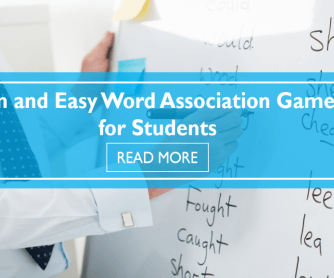
Whether you want students to learn new vocabulary words or just encourage them to think outside of the box, word association games can help. The main goal of a word association game is to help students make connections between words. These can be words related to a particular subject, key vocabulary words, or just random words you choose.
Basic Word Association
A basic word association game involves giving a student a word and having him/her state the first word or phrase that comes to mind. For example, if you say “ball,” the student might say “bat.” You can play this game in a variety of ways. One way is to give one word and have each student in your class write down or say the first word or phrase that comes to mind. Another way is to have students stand in a circle and give one student a word. That student will say the first word that comes to mind, and then the student to the right of that student will respond to the word the first student said, and so on until you go around the circle. If you only work with a small group of students, you can also complete this game digitally through the Human Brain Cloud.
Synonyms, Antonyms, and Rhymes
Another way to play the game is to have students respond to a given word with a synonym, antonym, or rhyme. This can help students recognize different ways that words are related. For example, if you say “hot,” you may have students go around the room and all provide a synonym for hot such as “smoking” or “heated.”
Secret Words
Instead of having students provide the words related to a given word, you can reverse the game and have students try to guess a secret word by providing related words or phrases. For example, if the secret word was “snow” you might say “cold,” “white,” “frozen,” etc. and keep giving words until students guess the secret word. This game works especially well with vocabulary words that students are learning.
Words Related to a Topic
Another way students can make connections between words is by focusing on words related to a common topic. This game can be played in one of two ways. First, you can provide students with a list of words and have them determine what all of those words have in common or provide a topic for the words. The second way to play is to provide a topic and have them try to think of as many words related to a topic in a given time period (say 2 minutes). You can make the challenge more difficult by focusing on a specific letter of the alphabet, for example “Winter Words Starting with S.”
Word Association and Personality
Carl Jung suggested that word association games could often reveal aspects of a person’s personality. For a bit of fun, take an online word association test or quiz and ask students to share whether they agree with the results they receive.
Chances are you’ll learn a lot about your students when you bring word association games into the classroom and they’ll begin to recognize that words have many different meanings. Most of your students won’t likely see the words in the same way.
P.S. If you enjoyed this article, please help spread it by clicking one of those sharing buttons below. And if you are interested in more, you should follow our Facebook page where we share more about creative, non-boring ways to teach English.








